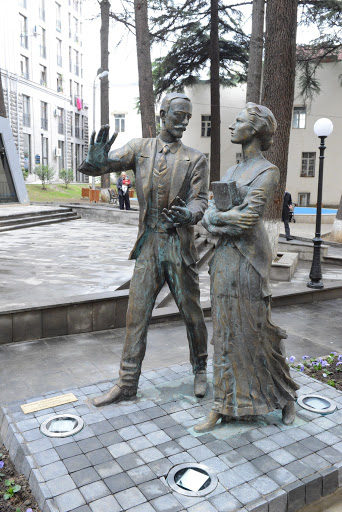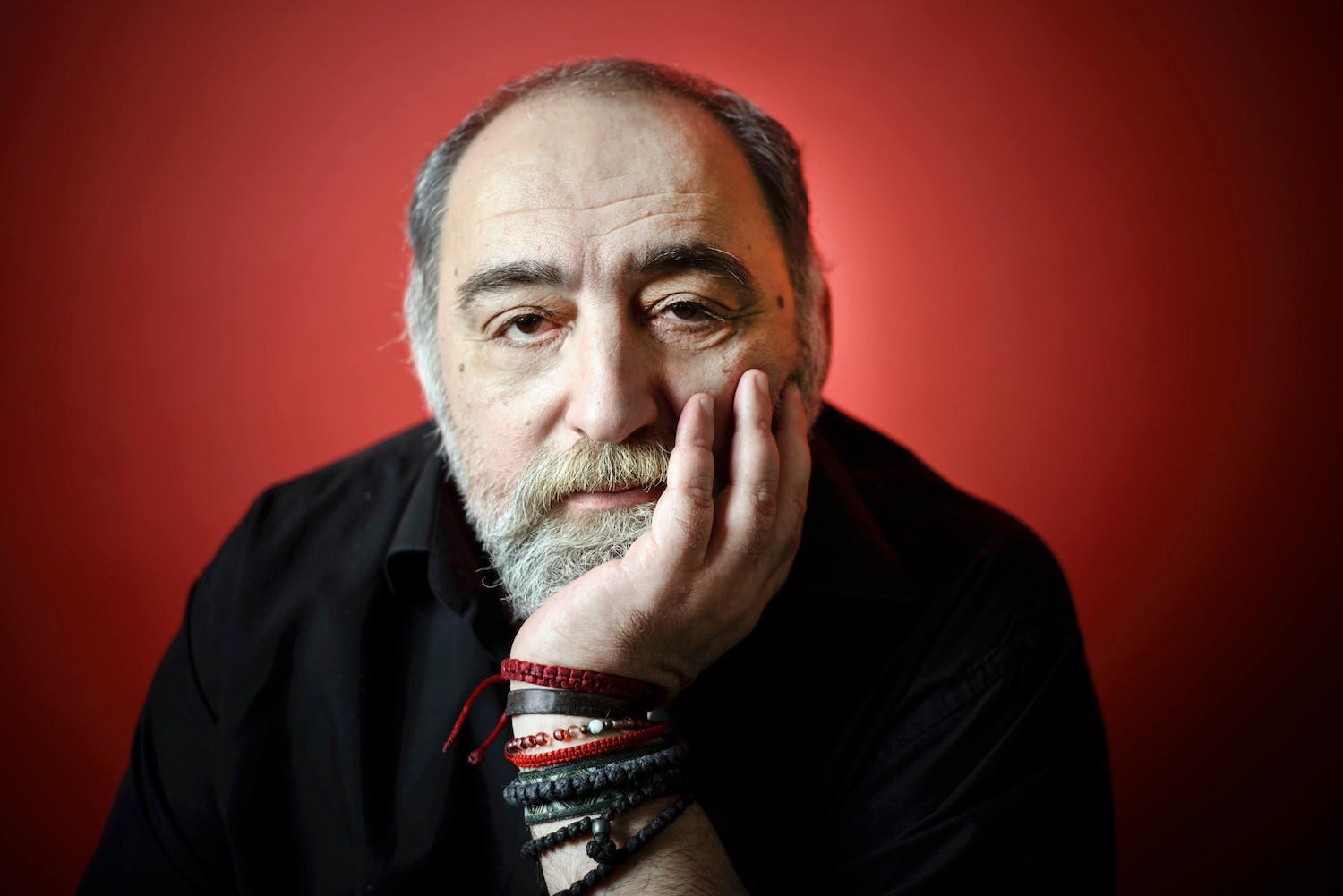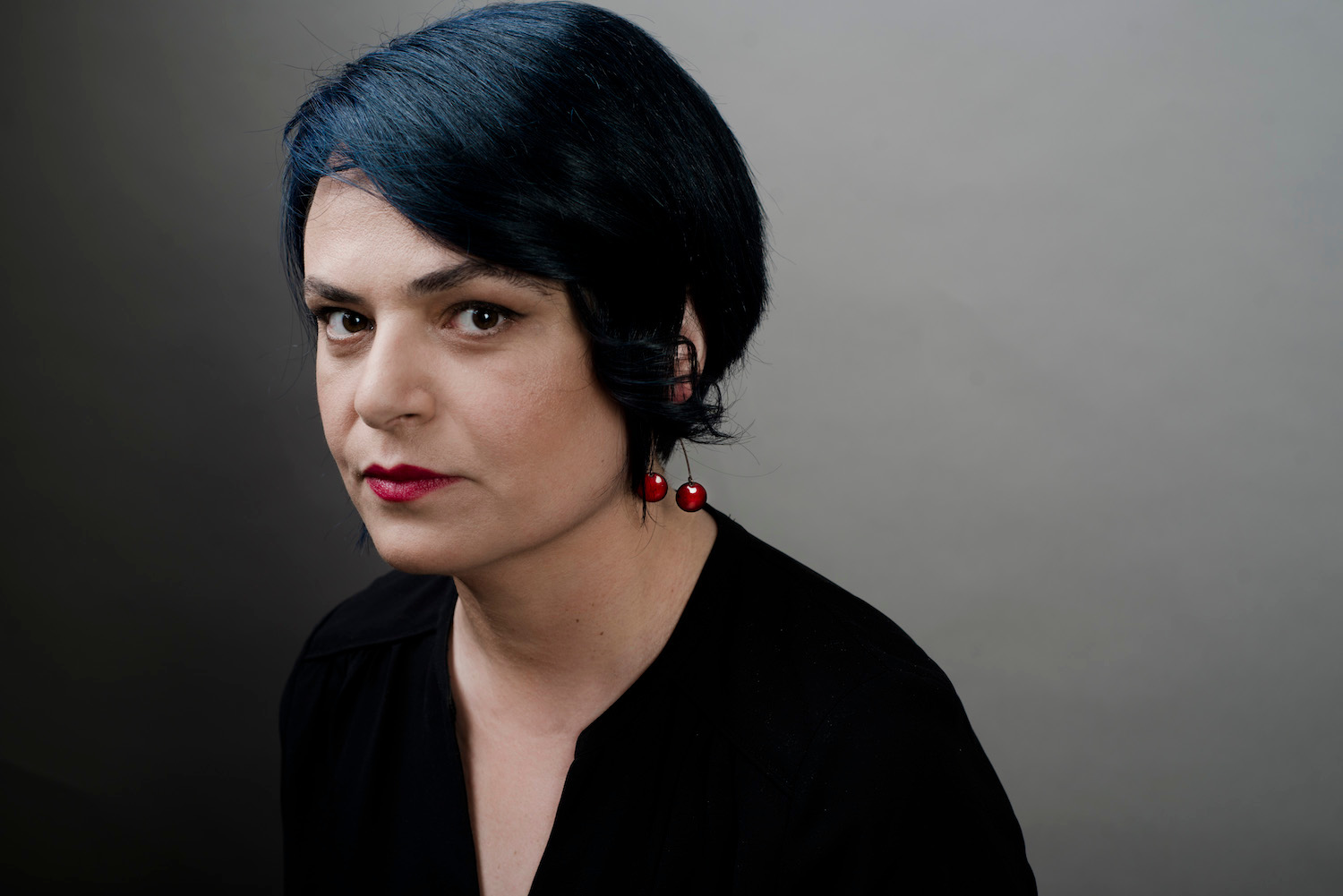In her quarterly column, Maya Jaggi, our Critic at Large, provides a brief history of Georgian letters, whose influences look east and west. Jaggi has curated Georgia’s Fantastic Tavern: Where Europe Meets Asia, an online festival of Georgian writers inspired by the café culture of Georgia’s first democratic republic of 1918–21, taking place online from February 25 to 28.
In a little park with soaring fir trees behind the old parliament in Tbilisi, the capital of Georgia in the southern Caucasus mountains, two translators are monumentalized in bronze. The mustachioed Oliver Wardrop, British high commissioner there a century ago, translated A Book of Wisdom and Lies by Sulkhan-Saba Orbeliani, an ambassador, fabulist, translator, and lexicographer, who met Louis XIV and Pope Clement on his European travels.

The bronze companion hugging a book to her breast is Wardrop’s sister Marjory, whose work included Georgian Folk Tales and Ilia Chavchavadze’s nineteenth-century Romantic poem, The Hermit. But she is most famous for her prose version of Shota Rustaveli’s The Knight in the Panther’s Skin, the national epic from Georgia’s medieval golden age, about an Arabian monarch who abdicates in favor of his daughter, and a melancholy knight in love with an Indian princess. Rustaveli’s chivalric masterpiece, penned during the courtly reign of a powerful queen they called King Tamar, refashioned Persian sources into a Georgian epic that looked both east and west, marrying Platonism with Sufism.
Marjory Scott Wardrop was still perfecting The Man in the Leopard’s Skin (her first draft of 1898) when she died in 1909. Posthumously published by her brother, her English prose stood its ground for more than a century until the American poet Lyn Coffin made the first verse translation in 2015—the year her forerunner’s statue was erected. The Knight in the Panther Skin astonishingly matches the twelfth-century original, with some 1,660 rhyming quatrains of sixteen-syllable lines, written in the Persian shairi form.
Geography has been destiny for Georgia and its literature, according to Zurab Karumidze, a prominent novelist and historian of jazz in Tbilisi. The country, he told me from a city under COVID curfews, has “always looked both ways.” A mountainous crossroads on the Silk Road, at the edge of empires, it was fought over and carved up for centuries, numbering Arabs, Mongols, and Ottoman Turks among its invaders. When Orbeliani wrote his eighteenth-century fables, eastern Georgia was an autonomous region of Persia. The Wardrops arrived after the country had been annexed by the Russian empire in 1801.
Yet Georgia, a small nation with fewer than five million people today, retained its own non-Indo-European language and ancient thirty-three-letter alphabet. Its oldest surviving literature dates from the fifth century, along with early Christian churches, while the wine-making culture reflected in its literature is as old as eight thousand years. Colchis, on its Black Sea coast, is the mythological home of Medea and the Golden Fleece. “Our influences are Middle Eastern, European, and Caucasian,” Karumidze said, “Georgians had to be very good translators, historically, to translate themselves to others, and others to one another—and to translate between East and West. This condition of translation was very important to the country. Starting from ancient Greece, Iran, and Biblical landscape, everything was mixed here.”
Centuries of invasion translate into cultural richness. Georgian, with loan words from Sanskrit, Greek, Persian, Arabic, Turkish, and Russian, is laden with synonyms—a protean tool for writers. Nino Haratischvili, who lives in Berlin and writes in both Georgian and German, said at the Frankfurt Book Fair where Georgia was Guest Country of Honor in 2018: “Georgia has been fighting for the identity it has claimed since antiquity and defended against all occupiers throughout the centuries. Many forget that identity is not something ossified . . . and that the richness of Georgian culture grew out of being permeable and perhaps brave, taking in foreign ideas and mixing them with its own in its search for novelties.”
Karumidze, Haratischvili, and poet-translator Coffin are among the speakers in Georgia’s Fantastic Tavern: Where Europe Meets Asia, an online festival of Georgian writers with a touch of food and song, streaming for a global English-language audience from February 25–28, 2021. As the festival’s artistic director, I curated the four-day program for Writers’ House of Georgia in Tbilisi, a city I first visited in 2014. Georgia’s Fantastic Tavern is in partnership with the British Library in London and Words Without Borders—which, starting today, is publishing four newly translated extracts from novels by festival authors who have made waves or won awards in Georgia. There are four days of online events, two of them ticketed and streamed by the British Library and Writers’ House in Tbilisi. All eleven talks will also available to watch afterwards. The digital tavern is a pandemic-era sequel to Where Europe Meets Asia: Georgia25, a weeklong London festival that I curated in 2016 for the Georgian National Book Center.
Georgia’s Fantastic Tavern takes its inspiration from the doomed cafe culture of another golden age of Georgian literature, whose end was tragic. A century ago, Tbilisi—known as Tiflis before 1936—was a “Paris of the East.” After the Russian revolutions of 1917, Georgia declared independence from the collapsing Tsarist empire. During its short-lived first democratic republic of 1918-21, Tbilisi became a haven for intellectuals fleeing the Russian civil wars—including Doctor Zhivago author Boris Pasternak. These exiles were welcomed by Georgian artists and writers such as the Blue Horn Symbolists, whose poet founders included Paolo Iashvili, Titsian Tabidze, and his cousin Galaktion Tabidze.
This cosmopolitan, polyglot avant-garde gathered in artists’ cafés such as the Fantastic Tavern, Argonauts’ Boat, Kimerioni, and Peacock’s Tail. The cafe walls became the blank canvas for Russian and Georgian artists returned from Paris and St. Petersburg, such as Lado Gudiashvili, whose painting for Kimerioni, Stepko’s Tavern, became the banner for this year’s festival. I had sought out this rare vestige of European modernist cafe culture on a visit to Tbilisi four years ago. The Rustaveli National Theater opened its closed basement for me, revealing the century-old wall painting on the stairs—recently restored—as well as work by another famous Georgian modernist, Davit Kakabadze, planting the seed that would later become this festival.
When the Bolsheviks invaded Georgia in February 1921, the Red Army not only crushed the democratic republic after only 1,028 days, but swept away its modernist avant-garde and the cafe culture that nurtured it. Georgia’s Fantastic Tavern begins on the centenary of Tbilisi’s occupation, February 25. Writers’ House contains portraits of the many writers who were executed in successive waves of Stalinist purges over the next two decades. Others committed suicide in an atmosphere of intolerable pressure to denounce colleagues, as socialist realism became the only acceptable form of art.
The seventy years of Soviet rule left a sense of rupture with this republic—a broken thread that many in today’s Georgia seek to repair. Haratischvili’s The Eighth Life: For Brilke (tr. Charlotte Collins and Ruth Martin), a multi-generational saga of the “Red century” written in German that won the 2018 Bertolt Brecht prize, alludes to the Blue Horn poets and uses lines of theirs as epigraphs. The novelist and playwright Dato Turashvili set his latest play on a train from Tbilisi to the Black sea in February 1921. Republic of Georgia (tr. Madonna Tkhelidze), which had a staged reading by the Voyage Theater Company at New York Public Library in 2019, takes place as the Red Army enters Tbilisi and members of the republican government flee into exile in France.

Aka Morchiladze revolutionized post-Soviet literature with his 1992 novel.
If Georgia’s modernist moment of the 1910s and ’20s was interrupted by Soviet invasion, postmodernism was forged during Soviet collapse in the 1990s. Aka Morchiladze, the pen name of Gio Akhvlediani, revolutionized post-Soviet fiction with his fragmented debut novel Journey to Karabakh (1992, tr. Elizabeth Heighway), in which a privileged youth from Tbilisi looking for drugs strays into the Nagorno-Karabakh war. The 1990s, Akhvlediani recalled from Tbilisi, were a “terrible time of civil war, paramilitaries—many guns from that time we still have—and the beginning of a new literature.” An earlier generation of novelists, such as Konstantine Gamsakhurdia, seemed stilted. “No one speaks like that. It wasn’t natural. I had this feeling, I have to use the language of the street guys and the youth. People loved it.” Yet, even thirty years into independence, he feels Georgia remains post-Soviet in outlook: “Everything’s about punishment and betrayal. It’s a Stalinist thing. We’re all traitors who must be punished. It’s still in our vocabulary. People don’t understand they’re speaking the language of Stalin’s time, which their parents reused.” While he drew on the Russian classics he grew up reading alongside Hemingway and Jack London, “after the 2008 war, young people abandoned Russian culture. The war finished it totally.”
Tamta Melashvili’s debut novel, Counting Out (excerpted in WWB in 2014), about teenage girls’ experience in an unnamed war, was written in the wake of that five-day August war with Russia. Speaking from Tbilisi, she recalled that time of “total fear and despair, with planes flying over, and explosions from the nearby town being bombed.” Although her second novel, Eastwards, is also set in present-day Georgia, it looks back to the poets of the First Republic. “We had only three years of independence,” she said, “but I’m totally in love with that precious period. We had social democracy, a parliament with women’s representation [and five women MPs]. I like to imagine what might have happened if we weren’t invaded by the Soviet Union. How could the country have developed?”
The protagonist of Eastwards, Irina, is researching Elene Dariani-Bakradze, a mystical poet believed to have had a secret affair with the Blue Horn poet Paolo Iashvili. There is speculation that she may have authored fourteen erotic poems attributed to him. “Feminists prefer this version against the literary establishment,” Melashvili said. “I started to play with these two versions. Irina tries to reach the true story of Paolo and Elena but rebuilds a new myth. I wanted to show how Georgians can’t get out of the constant cycle of reimagining myths and legends and not writing true history.” Georgians, she added, “still live in very turbulent times. There are no resources. We cling to the mythic past. Otherwise we’re not strong enough to navigate the present.”
Soviet history remains intractably painful. “The purges of the 1930s, no one likes to talk about them,” she said. “All fathers are related to the purges as survivors or perpetrators. Most of us prefer to keep a distance from this past.” But Stalinism shattered Georgia’s literature. “Most good writers were shot. Or the men were shot, and the women were marginalized, redirected towards children’s literature. Some even quit. From the ’40s to the collapse of the Soviet Union, there were almost no women writing, except one or two in the ’80s. They became lost souls in Georgian literary history.”

“Georgians still live in very turbulent times,” says writer Tamta Melashvili. “There are no resources. We cling to the mythic past. Otherwise we’re not strong enough to navigate the present.”
Playwright and novelist Davit Gabunia, who found fame aged twenty-two as the Georgian translator of Harry Potter (and later Shakespeare and Ibsen), explores a different kind of violence. His cinematic debut novel, Falling Apart, recalls Rear Window in its dark exploration of voyeurism, and broke ground it its treatment of a male sexual liaison. “Everyone neglects men,” he said from Tbilisi. “The problem is men. I write mostly about troubled masculinities. My novel is ‘pulp,’ written as a quasi-thriller crime story, but I try to put these ideas in accessible form. Everything is wrong with the main character because he has false ideas of masculinity.”
Tracing change in independent Georgia, Gabunia said: “In 2005 when I wrote my first short stories, I wouldn’t have dared to come out. I wrote naive gay stories under a pen name, and no one wanted to publish them in case of a backlash. Then for three years I never wrote a word. It’s not less dangerous now for LGBT people but, certainly in literary circles, things have changed. There’s a huge difference between then and 2017, when my novel came out.” He attributes the slowness of change, which drove him to abandon activism to write for theater, to Georgia’s instability. “We’re still very poor, underpaid in wild capitalism. A big change in mentality comes after years of stable and normalized life. Since we regained independence in 1991, there have not been five consecutive years without something happening—unrest, conflict with a breakaway region, civil war, economic collapse, extreme poverty. It continues now. We’re a society in constant unrest, where religion is very powerful. When there’s no rational prospect, people choose the medieval darkness of the Church.”
If, for Karumidze, a strong post-Soviet thread is that Georgian writers “had to reread and deconstruct their history,” they also “make fun of it. Before, Georgian history was sacred, mythologized. Most kings are saints of the Georgian Church, and so are the ninth-century fathers of nationalism. You’re not supposed to be sarcastic about them.”
Some writers have tested the limits of this humor. Cartoonist and writer Lasha Bugadze’s plays include Putin’s Mum and The President will Come to See You. His novel The Literature Express (tr. Maya Kiasashvili) pokes fun at Georgia’s EU aspirations, and opens with the 2008 war as tanks advance towards Tbilisi. His latest novel, A Small Country, fictionalizes the real scandal over his satirical short story “The First Russian” which explored the relationship between Georgia and Russia though the medieval Queen Tamar’s wedding night. “We don’t speak about our history,” Bugadze told me from Tbilisi. “Georgia needs to reflect on its history, and the relationship with Russia. People are afraid to speak of it. That’s why I had problems. I wrote about Queen Tamar’s first husband—people didn’t know he was a Russian. She’s a holy saint, a legend, so how can you talk about her private life?” He paused. “I understand why they’re afraid: it’s like trauma. Everything of pride in Georgia is in the past. Our historical heroes are part of our identity, so don’t speak about our kings, or Stalin. We had a funny story about Medea by Euripedes, a Greek, but a Georgian woman would never kill her child!”
Bugadze was threatened with excommunication, and personally reprimanded by the head of Georgia’s Orthodox Church (“He wags his finger, and says, ‘Why did you write this?’ Like the Inquisition”). “The Patriarch became Archbishop in 1977, the year I was born. He is the greatest Georgian politician,” Bugadze said. “The Church and the government have a very strange relationship. They’re very close together. Who is the main boss in Georgia? The prime minister or the Patriarch or the oligarch?”
While the novel reflects Georgia’s relationship with Russia from the late 1980s, “now the relationship is very different because Putin has a dream to recreate the Soviet Union. We have Russian soldiers and army bases in the middle of Georgia, in South Ossetia, only forty kilometers from Tbilisi. The border moves, like ‘moving Berlin Walls,’ we call them. It’s psychologically and emotionally very difficult. We’re very afraid but we’re living with this.” In Soviet times, he added, “there was great humor, with metaphorical language, and everybody understood that it was because of censorship. Now we’ve become very serious and literal, and more angry about everything—I write blogs at Radio Liberty. Historically, it’s really dangerous to live near Putin’s Russia.” On the recent flare-up over Nagorno-Karabakh to which Russian peacekeepers were sent, he said, “It’s an old empire. These are contradictions Russia can manipulate. It’s existential. Every day we think, what will they do?”
Bugadze, like Melashvili, points up stark generational conflicts within Georgia. “Young people are very liberal and free. It’s a battle between grandfathers and grandsons, not fathers and sons, and what is our way in the future: the West or nostalgia for the Soviet Union? They don’t see it as nostalgia but as the ‘real Georgia,’ because we’ve ‘lost our identity.’ But I can’t speak about the Soviet Union without the tragedy.”
WWB’s first excerpt from the festival is from The Southern Mammoth, a novel by Archil Kikodze, an actor, writer, filmmaker, photographer, birdwatcher, and eco-guide. Its main character is Tbilisi, the city where he was born and which became a war zone in his youth in the 1990s, with refugees filling its hotels. “My father was a professional rescuer who carried refugees on his back through the mountains,” he said from the city. “My generation came back from wars they lost, with weapons and complexes. There were semi-official gangs, everybody carrying weapons and shooting in the street. Big, heavy violence.” Tbilisi is the “only city I know very well and know too well to love. When I walk, I know tragic stories about each district and quarter, each yard. We’re very social people. We know things you don’t need to know about each other—stories, gossip. It’s support but it’s also heavy baggage.”

Actor, writer, filmmaker, and photographer Archil Kikodze, who was still a youth in the post-Soviet Tblisi of the 1990s.
The narrator’s father “was a shadow businessman in the Soviet period of stagnation in the ’70s and ’80s, when corruption was blossoming and Georgia was like a Riviera for Russia. His mother is a Georgian nationalist, so that can’t work.” Kikodze’s interest is not in “good guys conquered by bad guys. The collaborator is more interesting for me as a character because he’s coming from the same society with the same values. We had too, too many collaborators. We still have them.”
This novel also has a flashback to the First Republic. “Till now there’s no historical evaluation of the things that have happened to us,” Kikodze said. “All new governments come to power playing with our past and our ethnic conflicts. But literature tries harder to evaluate what happened. Official history is blind, so it’s an alternative. Personal stories are always a treasure for me, I collect not news stories but what’s behind them—people crushed in all those changes and bad times.”
For Gabunia, Georgian is an “incredible blessing and a curse: it’s a wonderfully rich language with a long literary tradition—we still have those texts—but we’re doomed to have a small audience.” The humble aim of Georgia’s Fantastic Tavern is to widen this pool, while introducing more English-speaking readers to a literature, and a culture, they will not want to miss.
© 2021 Maya Jaggi. All rights reserved.
Georgia’s Fantastic Tavern: Where Europe Meets Asia, an online festival of Georgian writers inspired by the cafe culture of Georgia’s first democratic republic of 1918-21, is presented by artistic director Maya Jaggi and Writers’ House of Georgia, in partnership with The British Library and Words Without Borders. It is streaming for a global English-language audience on 25-28 February 2021 and available to watch afterwards.









